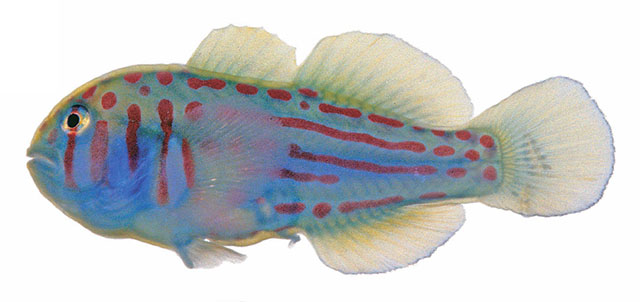| Gobiidae (Gobies), subfamily: Gobiinae |
| 5.4 cm TL (male/unsexed) |
|
reef-associated; marine; depth range 0 - 8 m |
| West Pacific: Indonesia, Cocos Is., Japan (Ryukyu Is.), Micronesia (Ponape), Australia and Papua New Guinea. |
|
Dorsal spines (total): 7-7; Dorsal soft rays (total): 10-11; Anal spines: 1-1; Anal soft rays: 8-10; Vertebrae: 26-26. This species possess many reddish spots/stripes on a yellow-green or sky-blue body; when alive or freshly-collected, it can be distinguished from similar reddish-spotted/lined congeners (G. aoyagii and G. histrio), by having the following set of details in color: 5-6 (usually 5) vertical reddish bars on head and pectoral-fin base; bars on cheek and operculum relatively short, usually not or barely reaching dorsally beyond a level of dorsal margin of eye; 3-8 longitudinal series of rounded or longitudinally elongate scarlet/reddish spots on body, sometimes continuous and forming longitudinal stripes; dorsal, anal and caudal fins are pale yellow with very narrow black distal margins; absence of a black spot at dorsoposterior corner of operculum. In alcohol-preserved specimens, all reddish spots are largely or entirely faded, but this species can still be distinguished from congeners by having a deep, inflected interopercle-isthmus groove; a series of minute non-imbricate cycloid scales on midlateral body; 6-7 upper or lower unsegmented caudal-fin rays; absence of a distinct dusky spot at dorsoposterior corner of operculum. Urogenital papilla in males are more narrowed distally and nearly triangular, while is females it is broader and nearly rectangular (Ref. 94251). |
| This species is observed to be found among branches of table-like corals, usually Acropora nasuta, also A. valida, A. millepora (the coarse branched form) and sometimes
A. tenuis (Ref. 94251). |
|
Vulnerable (VU); Date assessed: 28 June 2018 (A2c) Ref. (130435)
|
| harmless |
Source and more info: www.fishbase.org. For personal, classroom, and other internal use only. Not for publication.

